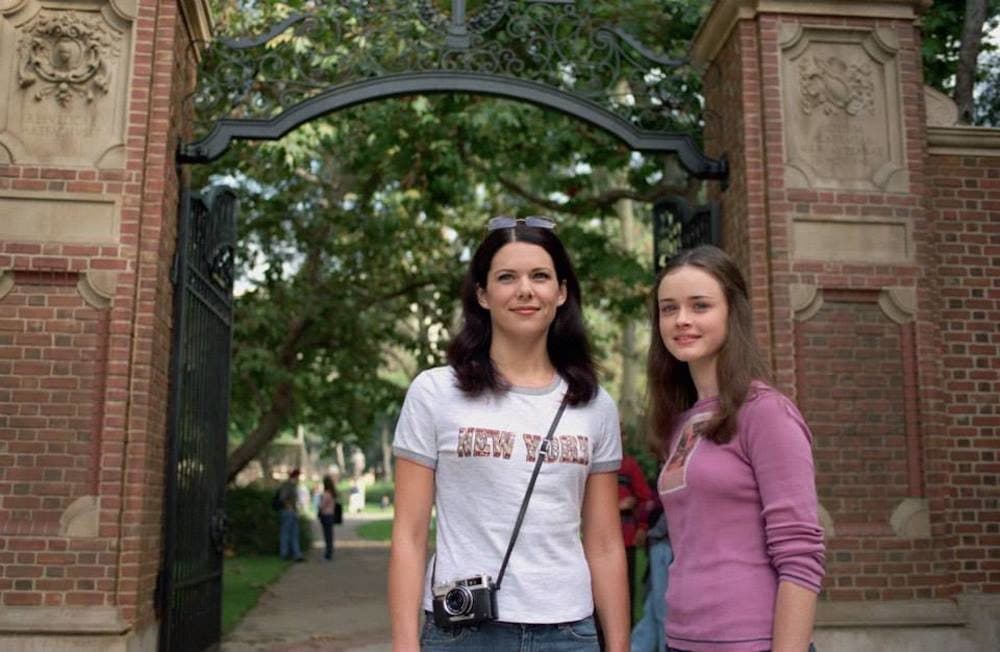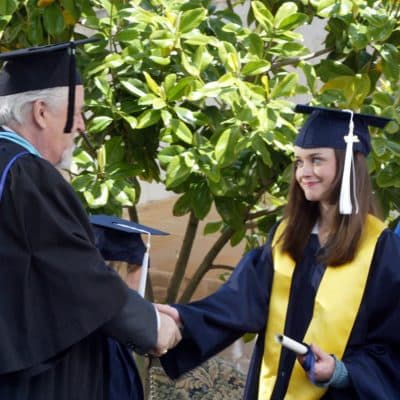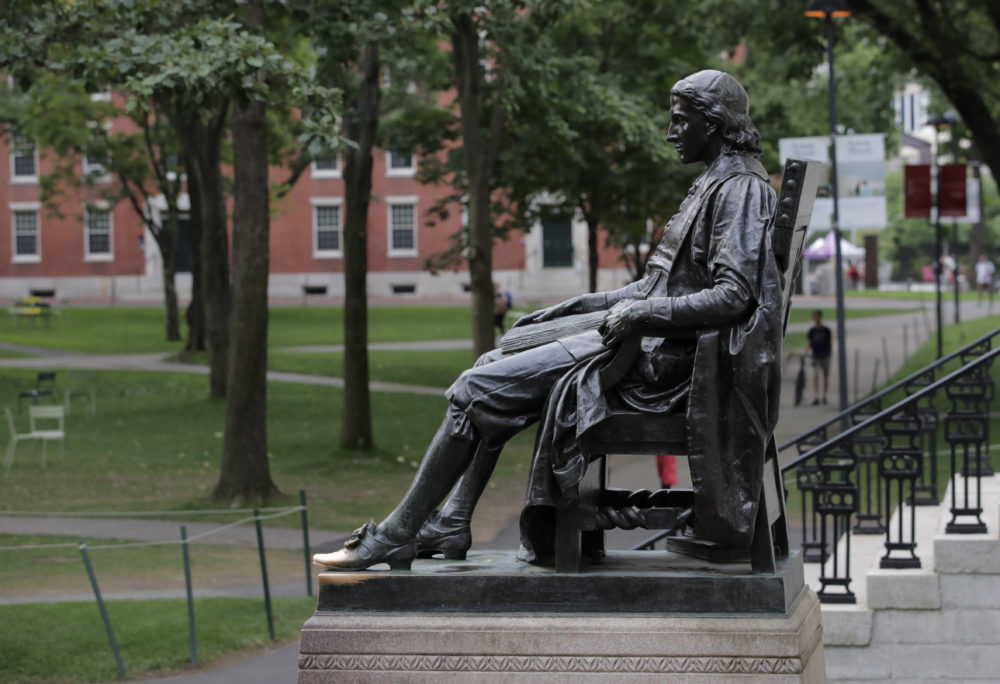Advertisement
Commentary
20 Years Later, The Shiny Promise Of College That 'Gilmore Girls' Portrayed

I exist because of a university admission committee’s decision. My parents met in medical school. When the committee decided to offer them spots, a group of people probably sat around a table, fluorescent lights buzzing. Maybe they were distracted, thinking about an experiment, or a colleague, or lunch.
That’s how I picture that process now, in my late 20s. As a high school senior, though, I thought college admission committees had divine insight and power. Those committees assessed and decided an applicant’s worth. They were gatekeepers to the “the best four years of your life,” the determinant of the rest of that life.
I’d grown up atheist, curious, hungry for some larger purpose to my days. Adults offered “Getting Into College,” and I took it. That quest answered the questions that would otherwise have kept me up at night — the questions that keep me awake now.
Some teenagers get into anime, or old films, fashion, sports. I got into getting into college.
Most nights, for a while, I’ve fallen asleep listening to “Gilmore Girls.” If you’ve never seen the show, it follows Lorelai and Rory Gilmore, a mother and daughter in small-town Connecticut, from Rory’s high school years through her graduation from college. The show keeps me company. It’s not always chill — one of my friends doesn’t watch it because the characters fight too much. But it comforts me. When I first watched, I didn’t really think about why I liked it. Years later, I’m still turning back to it.
I think it’s because the characters believe in the same college myth I grew up with. We follow them through relationships and breakups and family drama, but one imperative carries the story: getting Rory into Harvard.

My teenage years followed the same track. I went to a “pressure cooker” Boston-area prep school. I’ve never gotten less rest. Go to school, to practice, homework until 3 a.m., fall asleep in my clothes, wake up at 6 a.m., repeat. Fall of my senior year, I got A’s. The skin under my eyes turned a fragile blue. My advisor posted my report card on her wall. I’d succeeded.
Of my graduating high school class, the largest group of students all going to the same school went to Harvard. At what cost, though? Even now, every time I write “college essay,” I feel the old adrenaline/anxiety — a pairing that still makes me believe I have to feel stressed to be “productive.” My fellow nerds and I prepared with the singlemindedness, devotion and discipline of astronauts. We were kids.
Some teenagers get into anime, or old films, fashion, sports. I got into getting into college. This is why I think I’m susceptible to joining a cult: I kind of already did. I was told, "there is one most important thing to do, and you should devote your life to it, and it will make you happy and whole in ways you cannot imagine." I said, "yes, yes, where do I sign?" On the show, Rory’s the same. Lorelai worries about her, asks her to relax, but Rory doesn’t — and she gets into Harvard, Princeton and Yale.
The “Gilmore Girls” pilot aired 20 years ago. The college myth it’s based on — that my teenage years were based on — has since cracked. The Varsity Blues celebrity admissions scandal reminded us that the admissions process has never been the meritocracy it purported to be — even if celebrities’ kids can’t cheat the sports recruiting system, that system’s not meritocratic. Its least broken version is still broken. Kids get recruited for sports that only the wealthy play: lacrosse, crew. Then you have SATs and SAT tutoring, the pressure to pursue impressive-looking extracurriculars instead of working paying jobs, and more. Money tilts the admissions scales. It did on the show, too — Rory’s grandparents pay for her prep school and college tuition, her car, and more — but she’s still presented as scrappy and hardworking and deserving of a spot at a top college, and in the show’s world, that’s why she gets in.
As with all myths, the unified blur of what defined "college" served its power.
This year, with COVID-19, students who can’t come to campus ask themselves which parts of college are essential, and which are superfluous. As with all myths, the unified blur of what defined “college” served its power. Breaking up that definition — itemizing its parts, valuing them individually, selecting some but not all — erodes the mystique of the whole.
A show with the premise of “Gilmore Girls” couldn’t get picked up today. Watching it, though, I get the comfort of my old faith in the shininess, the promise, of getting into college. The show preserves the certainty in its power, that held breath.
I’m glad I’ve seen the man behind the curtain — but I miss the awe of the wizard’s show. I miss the simplicity of believing. I didn’t like sitting in math class, but I loved the feeling that I was supposed to be in each class, that spending these 90 minutes at this desk would move me towards college.
I thought, after going to undergrad, that I’d never again struggle with admission obsession. Then I applied to Harvard for grad school. I tried not to care about the name, but the old wanting crept back. Harvard. The nexus that all of this anxiety swirls around. I’d gotten rejected for undergrad. This time, I got in.
I started my master’s that fall — and Harvard lost its gloss. Of course, it did. Nothing you want so much is as good in the having, except love. Harvard both loves and hates itself. What else could happen when thousands of strivers move to a place that they’ve been sold as utopia? The getting-in anxieties spill into conversations on campus, like a bowstring snapping back on no arrow.

I lived by Harvard last summer. The campus was quiet, undergrads on their exotic breaks. I passed groups of tourists. They walked with selfie sticks held out, capturing everything. Rory and Lorelai took endless photos on their visit to Harvard, too. (“That’s a Harvard squirrel!” “Sitting on a Harvard rock!”) Tourists queued to touch the glowing foot of the John Harvard statue.
I knew something they didn’t: there’s a bucket-list tradition of Harvard students peeing on that statue’s foot at night. Gold in the sunlight, gold in the dark. Who is the fool, exactly? You can laugh at the tourists. I envied them, in the clarity of their certainty of value, of worth, of what did and did not merit desire.
